|
|
|
Sort Order |
|
|
|
Items / Page
|
|
|
|
|
|
|
| Srl | Item |
| 1 |
ID:
154654
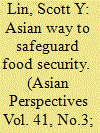

|
|
|
|
|
| Summary/Abstract |
During the twenty-first century's wave of transnational farmland investment, Asian countries contributed to about half of the investment. I therefore address the following major questions: What is the food security situation across Asian countries? What are the factors that drive Asian countries to join the transnational farmland investment movement? I argue that the following four factors give rise to the security problems in the food supply chain of Asian countries: (1) the developmental state model that leads Asian countries to sacrifice agriculture in their home countries; (2) the increases in food demand resulting from accelerated urbanization; (3) an unstable food supply chain causing Asian countries to seek reliable bases of food supply; and (4) food safety concerns that drive Asia to look for better quality farmlands. Today, as transnational farmland investment has become one of the models to maintain Asian countries' food security, this Asian model is also challenging contemporary global food security governance dominated by Western countries. The changes that it will effect over the course of this arduous process will also inform and shape future research within academia.
|
|
|
|
|
|
|
|
|
|
|
|
|
|
|
|
| 2 |
ID:
116497
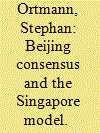

|
|
|
|
|
| Publication |
2012.
|
| Summary/Abstract |
What is today touted as the 'Beijing consensus' or the 'China model' is nothing more than a resized version of the 'Singapore model' or an attempt to revive the developmental state. In particular, the 'Beijing consensus' assumes a greater role for the state in the economy under authoritarian rule. Since Deng Xiaoping's Southern Tour in 1992, Chinese academics, politicians, and administrators have flocked to the soft-authoritarian city-state and the result has not only been a sprawling discourse but also a number of political reforms aimed at increasing the effectiveness of the state and strengthening one-party rule. An analysis of this discourse shows that while providing Chinese policy-makers with many important ideas, these studies reveal serious weaknesses in China's attempt to follow the 'Singapore model'. Instead of having found an alternative authoritarian state-capitalist model, the 'Beijing consensus' is only a transitory phase.
|
|
|
|
|
|
|
|
|
|
|
|
|
|
|
|
| 3 |
ID:
078478
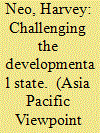

|
|
|
|
|
| Publication |
2007.
|
| Summary/Abstract |
Nature conservation efforts are often reactive to encroaching development plans and systematic conservation planning that is integral with development is not only uncommon, but is often fraught with difficulties even where it is actually attempted. Such obstacles to conservation are especially apparent in developmental states where state legitimacy is largely derived from the state's ability to develop the country. Among other things, developmental states place a premium on physical and economic development. This paper critiques, through the standpoint of nature conservation, the inadequate conceptualisation of `development' in the developmental state thesis. Specifically, this paper argues that the seemingly value-free (but ultimately economically based) underpinnings of development goals pushed by the developmental state needs to be tempered with a broader concern for the ethics of development. To that end, I draw on two case studies of nature conservation tussles in Singapore to show how alternative extra-economic visions of development have been articulated, notwithstanding the developmental state's monopoly on the discourse (and practice) of progress and development. The case studies, set in the heady economic growth of the early 1990s, will critique two related aspects of the developmental state: its `amoral' economistic conception of development and its use of growth and materialism as legitimacy
|
|
|
|
|
|
|
|
|
|
|
|
|
|
|
|
| 4 |
ID:
153240
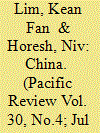

|
|
|
|
|
| Summary/Abstract |
The political-economic evolution of post-Mao China has been portrayed as a historically inevitable embrace of neoliberalism; as an exemplification of the East Asian developmental state and as an extension of Soviet New Economic Policy-style state capitalism. This paper evaluates these portrayals through a broad historical and geographical framework. It examines the position of China as a new state after 1949. It then places the shifting logics of socioeconomic regulation in China in relation to (1) the global neoliberal hegemony since the 1980s and (2) the concomitant shifts in the economic policies of Japan, South Korea and Taiwan. In so doing, the paper demonstrates how the Communist Party of China creatively adapted and re-purposed regulatory logics from the Washington Consensus and East Asian policies to consolidate its own version of Leninist state-led development.
|
|
|
|
|
|
|
|
|
|
|
|
|
|
|
|
| 5 |
ID:
175619
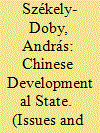

|
|
|
|
|
| Summary/Abstract |
Over the last 40 years, China’s development has been breath-taking. Its poor, centrally planned economy has been transformed into a middle-income capitalist one with a strong resemblance to highly successful East Asian economies like Taiwan and South Korea. It is argued here that China had become a developmental state by the mid-1990s, showing most features of its predecessors. At the same time, differences such as its huge size, socialist past, and structural problems have made it increasingly clear that China’s rapid growth rate is unsustainable. Instead of a strong and confident great power, one can only see a vulnerable giant with an inevitably decelerating economy.
|
|
|
|
|
|
|
|
|
|
|
|
|
|
|
|
| 6 |
ID:
160892


|
|
|
|
|
| Summary/Abstract |
The category ‘middle class’ was used increasingly throughout the 2010s to identify social changes occurring in African countries, including Ethiopia. However, the category itself is hard to define and has been employed to describe very diverse socio-economic dynamics. This article offers an original way of considering the ‘middle class’, focusing on what the category is expected to produce for the different actors utilizing it. We argue that the debate on ‘middle class’ social composition cannot be undertaken before deconstructing and discussing why, how and by whom the category is being used. As the notion of the middle class is subjectively and locally produced in every country, we focus on the perceptions and narrative of the category by external and internal actors and the specific political implications of such views in the Ethiopian context. By analyzing the international discourses and the Ethiopian leadership’s views, we demonstrate the fluidity of a notion deeply rooted in and interpreted based on specific institutional, ideological, and social backgrounds, and at the same time serving specific economic and political ambitions. In this regard, the Ethiopian case reveals how divergent actors have been promoting that same category with great differences in their interpretation and expectations. We thus argue that the category ‘middle class’ remains analytically useful only if not considered as an objective socio-economic category, but rather as a politically constructed category.
|
|
|
|
|
|
|
|
|
|
|
|
|
|
|
|
| 7 |
ID:
100311
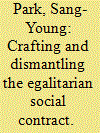

|
|
|
|
|
| Publication |
2010.
|
| Summary/Abstract |
Between the late 1960s and the early 1980s, the Korean developmental state implemented a series of drastic egalitarian educational policies that were primarily geared toward social integration. While promoting social mobility and educational expansion, they provided the basis of the egalitarian social contract in Korea's educational policymaking for decades. Since the 1990s, however, the Korean state has implemented neoliberal education reforms that led to the rapid dismantling of the egalitarian framework for the country's educational policymaking. These neoliberal reforms were strongly supported by the affluent middle class that prefer elitist education and can afford expensive private education. The general direction of change in Korea's educational policymaking suggests both significant change and continuity in the character of the Korean state and its relations to society since the 1990s. The contemporary Korean state still maintains a highly strategic and activist orientation in adopting and implementing policies although its policies are increasingly neoliberal in content. In doing so, the Korean state is gradually abandoning its broad social base and mobilizational capacity, while increasingly connecting with the upper segments of the middle class.
|
|
|
|
|
|
|
|
|
|
|
|
|
|
|
|
| 8 |
ID:
140251
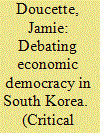

|
|
|
|
|
| Summary/Abstract |
In the 2012 Korean presidential election, both liberal and conservative parties fought their campaigns on the slogan of “economic democratization,” marking a strong departure from past presidential elections and the growth-first policies of the then-incumbent conservative administration. Both parties pledged to tackle growing social polarization and the concentration of economic power by reforming the corporate governance of Korea's large, family-led conglomerates (chaebol), to the degree that chaebol reform itself became synonymous with economic democratization. This focus led to a series of heated exchanges among liberal-left reformers about the vision of economic democratization being promoted, with one camp favoring the creation of a “fair market” through the restructuring of the chaebol and another promoting the protection of the chaebol’s management rights over their affiliates as a desirable strategy for the creation of a Korean welfare state. This essay examines the long-standing tensions between these two liberal-left perspectives and argues that the capital-centric and market-based visions these camps promoted risk confining intellectual debate over the meaning of economic democracy within boundaries that serve dominant political interests.
|
|
|
|
|
|
|
|
|
|
|
|
|
|
|
|
| 9 |
ID:
169214
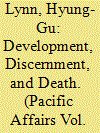

|
|
|
|
|
| Summary/Abstract |
Ron Dore’s 1977 article in Pacific Affairs, “South Korean Development in Wider Perspective,” is a rare example of the scholar known for his writings on Japan applying his analytical lens on South Korea. What were some of this article’s most notable areas of foresight and elision related to development studies? This essay answers this question by interpreting connections to publications before and after 1977 to analyze areas of insight under the rubric of “discernment” and overlooked subjects under “death.” On one hand, Dore’s essay was ahead of the curve in its deft foreshadowing of post-developmentalist, varieties of capitalism, and developmental state approaches to economic development. On the other, Dore sidestepped the effects of death on economic development in three forms: literal—effects of changing mortality rates on investments in education and human capital; industries related to death—wars, munitions production and arms expenditures; and the aftereffects of the death of a scholar—the revisiting and renewal of debates that can sometimes emerge as a result.
|
|
|
|
|
|
|
|
|
|
|
|
|
|
|
|
| 10 |
ID:
171521
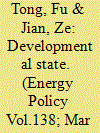

|
|
|
|
|
| Summary/Abstract |
Fossil fuel has been the main raw material in electricity generation though it is also the source of greenhouse gases and anthropogenic emissions from air pollution. To minimize the consumption of fossil fuel out of environmental concern, electricity needs to be allocated efficiently. Mainstream economics advocates arm’s-length regulation in allocation of utility products, but regulatory systems in most developing countries are underdeveloped. To the best of our knowledge, this paper offers the first attempt to identify that the trajectory of a developmental state is an option to a developing country. With micro-evidence from China, we document that more reliable electricity is supplied to firms with high value added, with robustness to the potential endogeneity bias. Thus, we find that electricity-allocation efficiency in China is positive and causally meaningful. As we further show, three important conditions of a developmental state determine allocative efficiency: political stability promotes allocative efficiency; whereas both corruption and harmful tax policies reduce allocative efficiency. Ultimately, we show that electricity in a developing country can be allocated efficiently by a developmental state even though its utility regulations are not mature.
|
|
|
|
|
|
|
|
|
|
|
|
|
|
|
|
| 11 |
ID:
123215
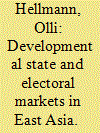

|
|
|
|
|
| Publication |
2013.
|
| Summary/Abstract |
Party systems in East Asia are characterized by a wide variety of party types, as formally institutionalized parties coexist next to informally and weakly institutionalized parties. This variety can be explained in terms of whether political parties enjoyed access to the developmental state's resources at the time of their formation.
|
|
|
|
|
|
|
|
|
|
|
|
|
|
|
|
| 12 |
ID:
094445
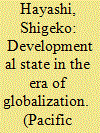

|
|
|
|
|
| Publication |
2010.
|
| Summary/Abstract |
Criticism of the developmental state can be divided into two categories. One is the neoliberal position that criticizes the efficacy of the developmental state model itself. According to this view, the developmental state was not an important factor in East Asian development and the adoption of industrial policy would in fact be detrimental to developing countries. A second critical position concedes that a degree of achievement was indeed attained by the developmental state in the past, but argues that the developmental state model is no longer a viable option today. This position holds that the high level of government intervention in successful East Asian countries more or less contributed to their economic development, but that this policy is no longer feasible. While deepening globalization in the world economy is regarded as inimical to the developmental state, some also argue that the developmental state model could only have worked during the Cold War and could not function in today's international political and economic climate. Despite these negative observations, the purpose of this article is to demonstrate the viability of the developmental state model. First, the article supports the statist position by broadening the scope of the argument: developmental states exist not only in Northeast Asia, but also in Southeast Asia, and the East Asian authoritarian regimes had a role in economic development. Second, this article directly counters new criticism of the developmental state. It argues that the developmental state model is still an effective development strategy in the post-Cold War period and even in the era of globalization: the model was useful in East Asia, and could be useful beyond East Asia.
|
|
|
|
|
|
|
|
|
|
|
|
|
|
|
|
| 13 |
ID:
168192
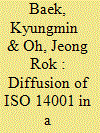

|
|
|
|
|
| Summary/Abstract |
ISO 14001, the most common voluntary environmental program in the world, has in recent years been diffused worldwide. However, the level of this diffusion varies across geographical regions. This article analyzes the case of Korea to illustrate how national institutional environments in the East Asia and Pacific region led to the rapid diffusion of ISO 14001. We hypothesize that developmental states have a highly favorable national institutional arrangement for the deployment of ISO 14001. This study finds that developmental states where governments implement strong initiatives for national development and economic growth, exemplified by Korea, are active in implementing neoliberal practices such as ISO 14001.
|
|
|
|
|
|
|
|
|
|
|
|
|
|
|
|
| 14 |
ID:
141400
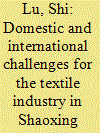

|
|
|
|
|
| Summary/Abstract |
This article recounts the transformations that have taken place in the textile industry in Shaoxing, Zhejiang Province, over the course of the past 30 years. It reveals the importance of the local setup and the links that have built up between companies, markets, and the state and its departments. It also exposes the difficulties experienced by companies as they try to adapt to their changing environment, whether in terms of opportunities offered by the domestic or international markets, or new regulations.
|
|
|
|
|
|
|
|
|
|
|
|
|
|
|
|
| 15 |
ID:
120620
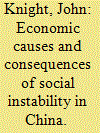

|
|
|
|
|
| Publication |
2013.
|
| Summary/Abstract |
This paper provides a survey of the economic literature relevant to social instability in China and moulds it into an argument. The objective is to offer a fresh view of economic policy and performance through the lens of the threat posed by social instability. This is a concept that economists rarely analyse, and yet it can lurk behind much economic policy-making. China's leadership has often publicly expressed its concern to avoid 'social instability'. It is viewed as a threat both to the political order and to the continued rapid growth of the economy. This threat to growth in turn endangers the maintenance of social stability. The paper examines the likely economic determinants of social instability, using both surveys and other evidence. After discussing the determinants of China's rapid growth, the paper goes on to examine the likely mechanisms by which social instability can affect the growth rate. There is a case for more research on the role of social instability in the economic development process.
|
|
|
|
|
|
|
|
|
|
|
|
|
|
|
|
| 16 |
ID:
160821
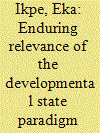

|
|
|
|
|
| Summary/Abstract |
Emerging economies have recently faced commodity price declines that reinforce the instability of natural resources as a basis for socio-economic transformation. This has re-energised arguments for industrialisation as necessary for such transitions. Drawing upon classical development economics theory, this paper offers a deployment of an enhanced developmental state paradigm (DSP) that highlights the roles of agriculture and mineral resources in the pursuit of industrial progress. This application of the DSP has its basis in narratives on Asian developmental states, with a focus on mineral resource endowment. Employed with reference to Africa’s key emerging economy and net petroleum exporter, Nigeria, the DSP shows how the state, influenced by significant milieus, has enabled linkages between oil and agriculture that can drive industrial transformation. The paper finds that linkages between oil and agriculture are well established; however, economic, social and political influences on the state have engendered agriculture’s limited onward contribution to structural change.
|
|
|
|
|
|
|
|
|
|
|
|
|
|
|
|
| 17 |
ID:
159401
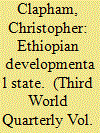

|
|
|
|
|
| Summary/Abstract |
Ethiopia provides one of the clearest examples of a ‘developmental state’ in Africa. Drawing on a deeply entrenched experience of statehood, the present Ethiopian regime has embarked on an ambitious programme, depending on the central capture of ‘rents’, to fund a massive expansion especially in communications, education, and hydroelectricity. High initial rates of growth have been achieved. However, the political setting is tightly constrained and the state has not allowed the private sector freedom of action to generate the required levels of production. Ultimate success will depend on the capacity to transform a state that has itself been central to the development process.
|
|
|
|
|
|
|
|
|
|
|
|
|
|
|
|
| 18 |
ID:
159404
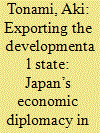

|
|
|
|
|
| Summary/Abstract |
Japan remains a developmental state where the state guides and oversees economic development, and the strong bureaucracy and businesses in turn complement each other in leading and shaping policies to achieve developmental goals. Japan retains the institutions deemed necessary to enhance the cooperative behaviour of the bureaucracy, businesses and politicians, and norms about what is important in order for an interventionist state to implement policies aimed at achieving economic development and the autonomy of the state. Externally, Japan has practised economic diplomacy with tools such as development assistance to achieve its economic security and to promote the developmental state model abroad. The process of making foreign policy contextualised and reinforced the norms, for both Japan’s domestic and international audiences. Japan today tries to promote science and technology as a main catalyst for creating industries and supporting its domestic, export-oriented economy. This is based on Japan’s own interpretation of its historical path and economic success and is also used to justify its engagement in the Arctic, a region where Japan does not have any sovereign territories. Japan’s Arctic policy is as an extension of its economic diplomacy and an attempt to export the Japanese developmental state model.
|
|
|
|
|
|
|
|
|
|
|
|
|
|
|
|
| 19 |
ID:
159402
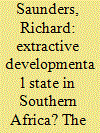

|
|
|
|
|
| Summary/Abstract |
In recent years, an upturn in international commodity markets and the poor development performance of mineral rich African countries have catalysed the resurgence of debate and policy initiatives focused on extractivist models of growth in southern Africa. Beginning with debates on the ‘resource curse’, the East Asian developmental state and ‘developmental patrimonialism’, we extend the discussion to consider key unique challenges in contemporary African states: questions of finance and debt leverage, foreign capital domination and the problematic legacy of neoliberal structural adjustment. We consider the cases of Zambia and Zimbabwe, two countries heavily reliant on mining, in which current policy interventions have sought to anchor developmental state ambitions in the restructuring of the minerals sector. These cases illuminate the significance of current developmentalist politics in southern Africa, and underscore their specificity and constraints. Developmentalist projects are unlikely to succeed in the short term, but retain importance as emerging points of critique of neoliberal states in transition.
|
|
|
|
|
|
|
|
|
|
|
|
|
|
|
|
| 20 |
ID:
160454
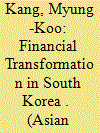

|
|
|
|
|
| Summary/Abstract |
This paper addresses why and how South Korea’s financial system has diverged drastically from the Japanese model since the early 1980s and has turned to the US model, which is often regarded as a more market-oriented financial system. The paper traces the rise of American-trained Korean economists in the Economic Planning Board and their collaboration with other such economists in public and private economic institutes and academia.
|
|
|
|
|
|
|
|
|
|
|
|
|
|
|
|
|
|
|
|
|